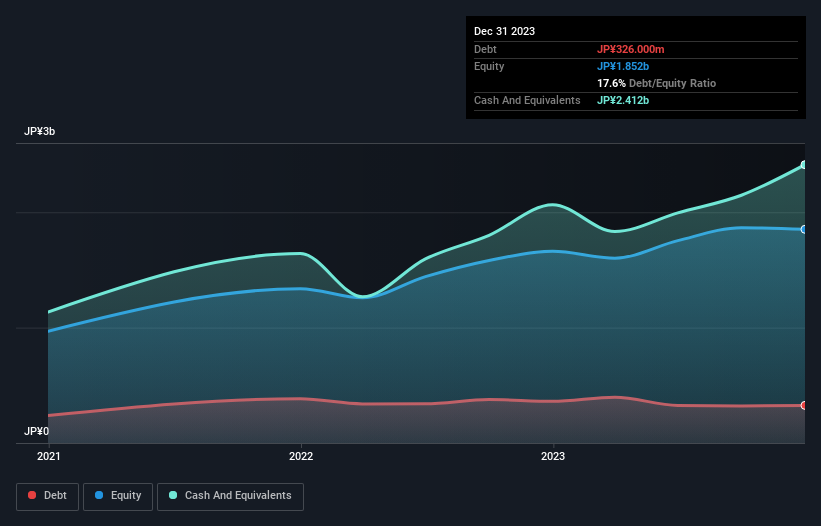Legendary fund manager Li Lu (who Charlie Munger backed) once said, 'The biggest investment risk is not the volatility of prices, but whether you will suffer a permanent loss of capital.' So it might be obvious that you need to consider debt, when you think about how risky any given stock is, because too much debt can sink a company. As with many other companies WILLs Inc. (TSE:4482) makes use of debt. But is this debt a concern to shareholders?
When Is Debt Dangerous?
Generally speaking, debt only becomes a real problem when a company can't easily pay it off, either by raising capital or with its own cash flow. Part and parcel of capitalism is the process of 'creative destruction' where failed businesses are mercilessly liquidated by their bankers. However, a more frequent (but still costly) occurrence is where a company must issue shares at bargain-basement prices, permanently diluting shareholders, just to shore up its balance sheet. Of course, the upside of debt is that it often represents cheap capital, especially when it replaces dilution in a company with the ability to reinvest at high rates of return. When we examine debt levels, we first consider both cash and debt levels, together.
View our latest analysis for WILLs
What Is WILLs's Net Debt?
The image below, which you can click on for greater detail, shows that WILLs had debt of JP¥326.0m at the end of December 2023, a reduction from JP¥361.0m over a year. But it also has JP¥2.41b in cash to offset that, meaning it has JP¥2.09b net cash.

How Strong Is WILLs' Balance Sheet?
The latest balance sheet data shows that WILLs had liabilities of JP¥1.77b due within a year, and liabilities of JP¥41.0m falling due after that. Offsetting this, it had JP¥2.41b in cash and JP¥314.0m in receivables that were due within 12 months. So it actually has JP¥916.0m more liquid assets than total liabilities.
This short term liquidity is a sign that WILLs could probably pay off its debt with ease, as its balance sheet is far from stretched. Simply put, the fact that WILLs has more cash than debt is arguably a good indication that it can manage its debt safely.
On top of that, WILLs grew its EBIT by 30% over the last twelve months, and that growth will make it easier to handle its debt. When analysing debt levels, the balance sheet is the obvious place to start. But it is future earnings, more than anything, that will determine WILLs's ability to maintain a healthy balance sheet going forward. So if you're focused on the future you can check out this free report showing analyst profit forecasts.
But our final consideration is also important, because a company cannot pay debt with paper profits; it needs cold hard cash. While WILLs has net cash on its balance sheet, it's still worth taking a look at its ability to convert earnings before interest and tax (EBIT) to free cash flow, to help us understand how quickly it is building (or eroding) that cash balance. Over the most recent three years, WILLs recorded free cash flow worth 79% of its EBIT, which is around normal, given free cash flow excludes interest and tax. This free cash flow puts the company in a good position to pay down debt, when appropriate.
Summing Up
While it is always sensible to investigate a company's debt, in this case WILLs has JP¥2.09b in net cash and a decent-looking balance sheet. And we liked the look of last year's 30% year-on-year EBIT growth. So is WILLs's debt a risk? It doesn't seem so to us. Over time, share prices tend to follow earnings per share, so if you're interested in WILLs, you may well want to click here to check an interactive graph of its earnings per share history.
If you're interested in investing in businesses that can grow profits without the burden of debt, then check out this free list of growing businesses that have net cash on the balance sheet.
Valuation is complex, but we're here to simplify it.
Discover if WILLs might be undervalued or overvalued with our detailed analysis, featuring fair value estimates, potential risks, dividends, insider trades, and its financial condition.
Access Free AnalysisHave feedback on this article? Concerned about the content? Get in touch with us directly. Alternatively, email editorial-team (at) simplywallst.com.
This article by Simply Wall St is general in nature. We provide commentary based on historical data and analyst forecasts only using an unbiased methodology and our articles are not intended to be financial advice. It does not constitute a recommendation to buy or sell any stock, and does not take account of your objectives, or your financial situation. We aim to bring you long-term focused analysis driven by fundamental data. Note that our analysis may not factor in the latest price-sensitive company announcements or qualitative material. Simply Wall St has no position in any stocks mentioned.
About TSE:4482
WILLs
Develops and offers a shareholder management platform utilizing blockchain technology in Japan and internationally.
Outstanding track record with excellent balance sheet.
Market Insights
Community Narratives



